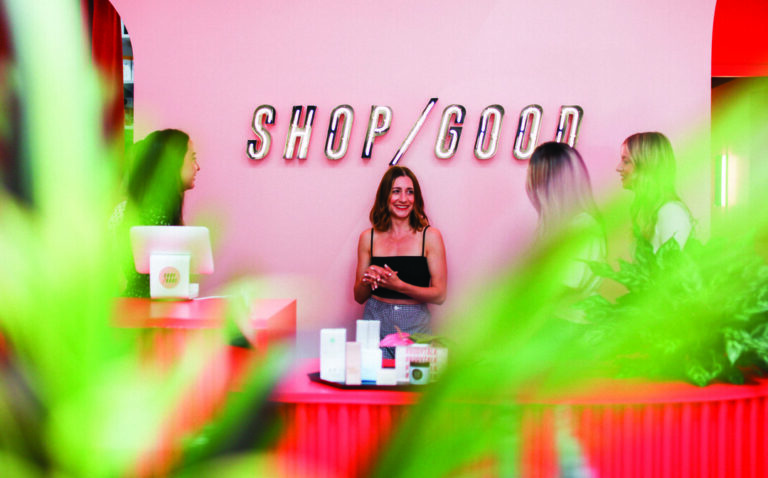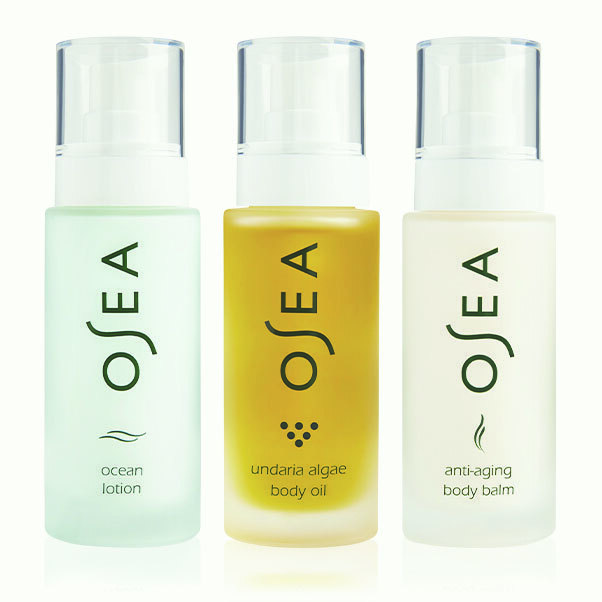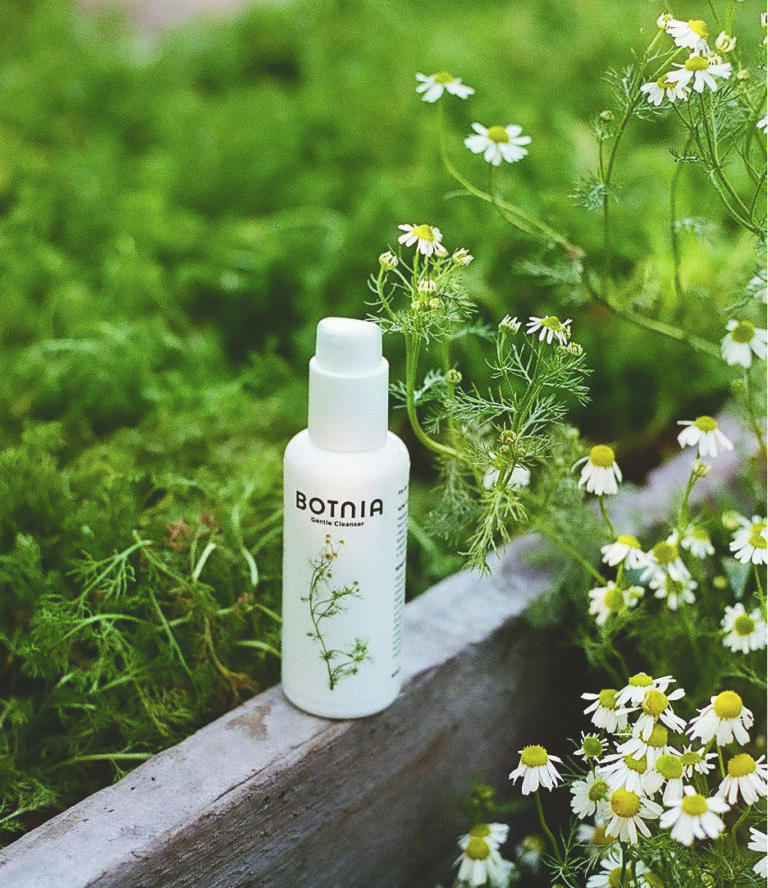4 MINUTE READ from Wellness Interactive Branding, LLC.
“She works closely with local California farmers, receiving shipments of leafy kale and goat's milk yogurt, and grows many of her own ingredients in her backyard with homemade compost. But Justine Kahn is not a chef.“
By Amber Gibson.
She’s an aesthetician and founder of Botnia Skincare, crafting small batches of plant-based skincare at her micro lab in Sausalito using the highest quality organic plants – just like you might find in fine dining restaurants. Along with plants from her garden and certified-organic California farms like Marin Roots Farm, Kahn also works closely with SingleThread Farms, the three-star Michelin restaurant in Healdsburg, to source botanicals like chamomile and calendula. The pollinators attracted by these herbs help create a healthier ecosystem for the produce that’s used at the restaurant.
Plant-based skincare is an important part of the clean beauty movement, the largest portion of the wellness economy, which continues to grow, outpacing conventional beauty and skincare. The global organic personal care market size was estimated at $13.33 billion in 2018, and is projected to reach $25.11 billion in 2025, according to Grand View Research. Despite beauty sales dropping significantly since the pandemic hit, prestige clean beauty is up 11 percent this year, according to The NPD Group. Over the past decade, shops like The Detox Market, Follain and Credo have educated consumers on the benefits of clean beauty while challenging retailers like Sephora and Ulta. Documentaries like Toxic Beauty urge us to think more critically about the ingredients that we’re putting on our body’s largest organ. What if we fed our skin the same pure, nourishing foods that we eat?

“Simple skincare is more effective and healthy,” Kahn says. “We make our own hydrosols and extracts from our plants, grown in healthy soil, to ensure that the raw ingredients we use in our skincare come to your face fresh and ready to heal, nourish, and ultimately contribute to your overall health and well-being.” Kahn extracts hyaluronic acid from edamame and squalene from olive skins. With her radiant skin, Kahn’s fresh-faced beauty speaks for itself and she’s the ideal spokesmodel for her company.
As customers begin taking more interest in how products are grown and manufactured, big retailers like Nordstrom are taking note too. Nordstrom just started carrying Botnia in August 2020 and have grown their inventory of natural beauty products dramatically over the past few years. Prestige beauty brands like Yves Saint Laurent (YSL) have embraced the plantbased trend as well. YSL Beauty’s new collection of serums all feature different plants or flowers sourced from the brand’s Ourika Gardens in Morocco. The night reboot serum even includes moonlight cactus extract, a plant that only blooms for six hours every year.
“Plants are a great source of natural antioxidants, vitamins, and hydration to support healthy skin,“ says board-certified dermatologist Jessie Cheung MD. “Look for plant ingredients with minimal processing, and preferably organic, listed first on the ingredient list. Beneficial plant ingredients include polyphenols, fatty acids, oils, carotenoids, catechins, and phytosterols.“
Cheung says more of her clients are seeking to decrease exposure to synthetic chemicals due to possible associations with hormone disruption and disease.


Leah Kirpilani, founder of San Deigo’s clean beauty emporium Shop Good, is a Botnia devotee and also carries brands like Tata Harper, Agent Nateur, and OSEA Malibu at her boutique. “We have seen incredible results in our clients’ skin utilizing plant-based skincare,” she says. “Most end up benefiting from a radical shift into simpler, plant ingredients and even a gentler approach. This can work to build the skin’s moisture barrier back up and reestablishing the skin’s normal oil production, supporting a more plump, youthful, and hydrated complexion.”
During the pandemic, Kirpalani created at-home facial packages and consultations when she wasn’t able to offer facial treatments at Shop Good. Weekly Instagram TV natural skincare tutorials were a big hit and helpful resource to clients stuck at home. Travel restrictions may be slowly lifting, but Kirpalani’s clients are better equipped to give themselves facials complete with gua sha at home.
OSEA Malibu was at the forefront of the plant-based skincare trend when they began making their ocean cleanser and atmosphere protection cream from certified organic seaweed, blended with cold-pressed essential oils 24 years ago. “At that time, most people were unaware of the harmful effects of some of the most common skincare ingredients,” says OSEA founder and formulator Jenefer Palmer. “People did not really believe that plantbased products would work, much less be more effective than traditional skincare.”
Palmer recommends that clients play facialist once a week at home. “It just takes an extra 10 minutes,” she says. “Double cleanse, exfoliate, and then mask. But most importantly, massage and layer products into your skin. Start with a serum, next a face oil, and then your favorite moisturizer. This will help your skin glow and feel like you’ve just come from the spa!”
At The Shore Club in Turks and Caicos, Tata Harper facials are among the most popular treatments. Aesthetician Romaina Talbot says that Tata Harper is especially good for clients who have rosacea or eczema because it’s so gentle. “These peels don’t leave you literally peeling for days and avoiding the sun,” Talbot says. “There’s no redness, you’re just glowing.” The multi-acid peel used in Tata Harper’s signature brightening facial is made entirely from plant-based extracts like pomegranate and papaya enzymes.

The best and most effective plant-based skincare products are grounded in scientific research too. Botnia works with a Stanford-trained plant biologist to get the maximum nutritional benefits from each plant and you can book a facial at Kahn’s boutique spa in San Francisco, Skin Remedy, where individual ingredients are mixed to order to treat the skin in that moment. Newcomer For The Biome treats the skin and its microbiome holistically, using fermentation and volcanic CO2 extraction to increase antioxidant capacity in their formulations. Their ingredient glossary explains the benefits of active ingredients from ashwagandha and amaranth seed to pomegranate seed and radish root, detailing where each is harvested and in which products it appears.
Sustainability is also a key value for these plant-based brands. OSEA bottles their products in recyclable glass and sources hand-foraged seaweed from a family-operated cooperative in Patagonia rather than relying on suppliers using invasive methods to harvest from the ocean floor. While some beauty brands might claim to be green but purchase bulk plant extracts, both Tata Harper and Botnia value transparency and tout the farm-fresh origins of their ingredients. Both of their websites have traceability tools, so customers can learn more about when and how their product was made. Not only is plant-based skincare healthier for you, but these low-impact brands aim to make it more sustainable for the planet too.
The pandemic has reinforced how interconnected we all are in this world, both to the earth and to one another. Plant-based skincare is not just a trend but a return to our roots as we rediscover how to nourish our skin with the gifts from nature. We’re going to see more products in this space in the coming years, and who knows, more seed to skincare kits for those who want to do this at home. These products are making people realize that Mother Nature always knows best.

Amber Gibson is a Chicago-based journalist specializing in travel, food, beauty and wellness. Her work has appeared in Conde Nast Traveler, Saveur, Departures and Travel + Leisure.
Copyright © 2024 Wellness Interactive Inc. All rights reserved. Terms of Use | Privacy Policy